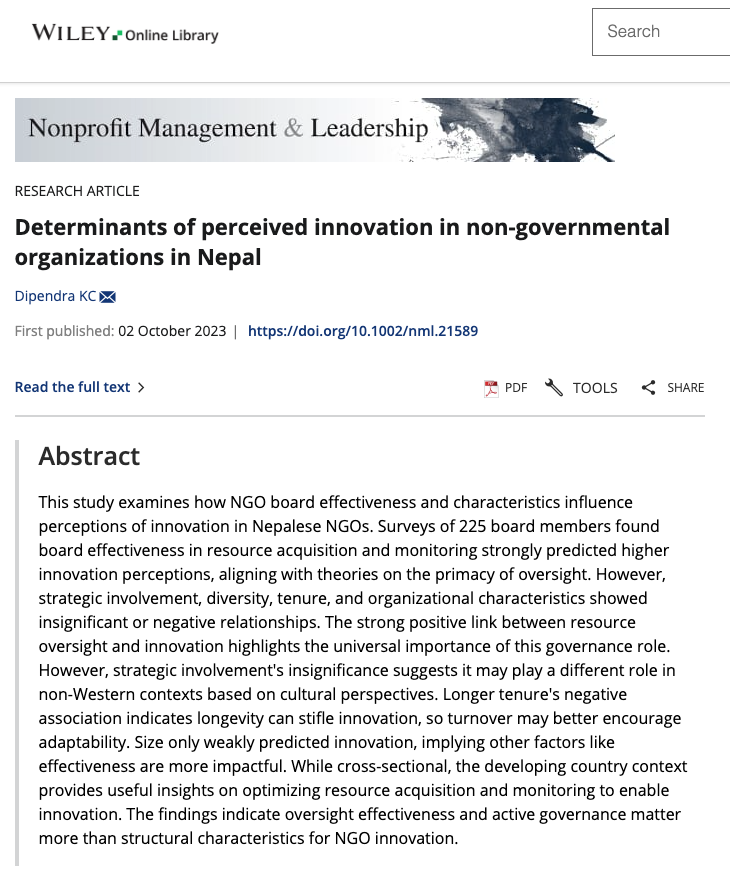This opinion piece is based on my recent journal article.
Nepal’s vibrant civil society sector has long played an indispensable role in the country’s development journey. With over 60,000 registered non-governmental organizations (NGOs), the nonprofit sector has been instrumental in driving progress on healthcare access, education, poverty alleviation, social justice, and numerous other areas that enhance Nepali lives. The commitment and service of NGOs have supported vulnerable communities and filled gaps where government capacity falls short.
However, Nepali NGOs now face a confluence of pressures that necessitate increased innovation and adaptability in their operations. As Nepal graduates from the least developed country, the foreign aid that previously sustained many NGO activities will steadily decline. The government also aims to reduce reliance on foreign funding sources. Additionally, a new wave of not-for-profit companies is emerging as entrepreneurs identify social needs that can be addressed through market-based solutions. These entrepreneurial entities, with their nimble and disruptive approaches, threaten NGOs’ traditional dominance and stable funding streams in service delivery roles. At the same time, the Nepali public is calling for greater transparency and accountability from NGOs in how they utilize funds and achieve impact.
To successfully navigate these disruptions in the nonprofit sector’s operating context, innovation must become ingrained in the DNA of NGOs. Incremental improvements to programs and processes will be insufficient – many organizations will require transformational changes to adapt to the new environment. Enhancing organizational innovation starts with governance, as the board of directors sets the vision and oversees execution.
My research on Nepali NGO governance aimed to uncover how board effectiveness, diversity, and other characteristics influence perceived innovation capacity. I surveyed 225 board members from NGOs representing all seven provinces and nearly 80% of Nepal’s districts. The results revealed actionable insights on how to optimize nonprofit governance for fostering innovation:
Firstly, board effectiveness in two oversight responsibilities strongly predicted higher innovation perceptions – acquiring financial, human, and partnership resources and monitoring operations. Boards that excel at garnering resources, through their networks and fundraising expertise, provide NGOs with the means to experiment with new initiatives, technologies, and partnerships. Meanwhile, robust monitoring ensures programs align with strategic goals and the needs of beneficiaries, which continually evolve. However, no association emerged between boards’ involvement in strategy setting and perceived innovation. This suggests that in the Nepali context, securing resources and oversight matter more than vision crafting for enabling innovation.
Secondly, common measures of board diversity, like gender representation and background variety, did not positively relate to innovation capacity. This highlights that diversity’s benefits are not automatic – inclusive participation and active integration of diverse perspectives into decision-making processes are essential to generating creativity. Similarly, longer board chair tenure predicted significantly lower innovation perceptions, likely due to complacency and risk aversion associated with leadership longevity.
These findings showcase that board effectiveness in executing resource and oversight responsibilities matters more than structural diversity or tenure characteristics for fostering NGO innovation. Governing boards must move beyond check-the-box diversity metrics and tenure policies to focus on how governance activities can actively enable innovation.
Based on these data-driven insights from Nepali NGO board members, I recommend nonprofit boards consider five strategies to ingrain innovation into their governance approaches:
Set innovation expectations – Boards should establish an explicit organizational innovation mandate that cascades down to all policies and operations. This provides a vision that adaptability and creative solutions are a priority on par with programmatic work.
Recruit resourceful directors – Seek board members with diverse professional and social networks who can garner financial, human, and partnership resources to fuel innovation initiatives. Move beyond demographic diversity toward cognitive diversity in perspectives.
Structure effective committees – Establish dedicated board committees, like a Strategy & Innovation Committee, that bring specialized oversight and attention to innovation activities across the organization.
Cultivate inclusive participation – Intentionally create a board culture where all members, regardless of gender, age, ethnicity, or other attributes, are empowered to freely share ideas, concerns, and critiques during discussions.
Rejuvenate leadership – Consider instituting board chair term limits to inject new perspectives into governance while retaining institutional knowledge by staggering director terms.
More broadly, the influx of nimble, entrepreneurial companies creating social impact also highlights the need for Nepali NGOs to reorient from reactive aid recipients to proactive innovators. The established community presence and trust of many NGOs offer advantages in this changing environment, but realizing this potential requires governance focused on promoting experimentation, informed risk-taking, and accelerating promising solutions.
Rather than resting on the accomplishments of the past, NGO boards must critically examine whether current governance activities, cultures, and policies actively foster the level of creativity and adaptability required in the new Nepal. Their success in fulfilling missions and benefiting communities will increasingly hinge on how effectively boards embrace their strategy guidance and oversight duties to drive innovation throughout their organizations. An innovation imperative now faces the leaders of Nepali NGOs – by transforming governance approaches, this vital sector can meet the moment.
